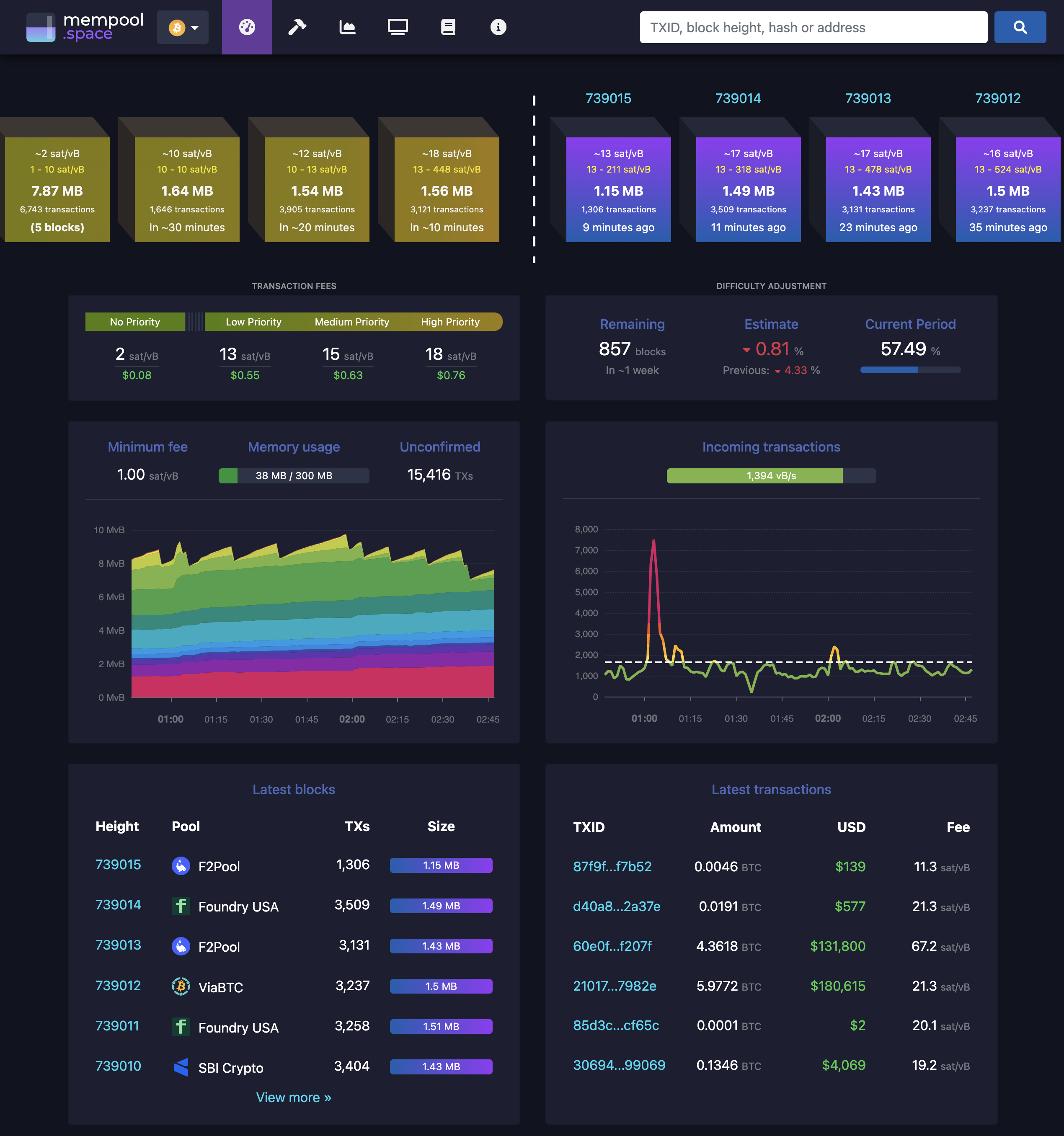# The Mempool Open Source Project™ [](https://dashboard.cypress.io/projects/ry4br7/runs)
Mempool is the fully-featured mempool visualizer, explorer, and API service running at [mempool.space](https://mempool.space/).
It is an open-source project developed and operated for the benefit of the Bitcoin community, with a focus on the emerging transaction fee market that is evolving Bitcoin into a multi-layer ecosystem.

# Installation Methods
Mempool can be self-hosted on a wide variety of your own hardware, ranging from a simple one-click installation on a Raspberry Pi full-node distro all the way to a robust production instance on a powerful FreeBSD server.
We support the following installation methods, ranked in order from simple to advanced:
1) [One-click installation on full-node distros](#one-click-installation)
2) [Docker installation on Linux using docker-compose](./docker)
3) [Manual installation on Linux or FreeBSD](#manual-installation)
4) [Production installation on a powerful FreeBSD server](./production)
This doc offers install notes on the one-click method and manual install method. Follow the links above for install notes on Docker and production installations.
## One-Click Installation
Mempool can be conveniently installed on the following full-node distros:
- [Umbrel](https://github.com/getumbrel/umbrel)
- [RaspiBlitz](https://github.com/rootzoll/raspiblitz)
- [RoninDojo](https://code.samourai.io/ronindojo/RoninDojo)
- [myNode](https://github.com/mynodebtc/mynode)
- [Start9](https://github.com/Start9Labs/embassy-os)
## Manual Installation
The following instructions are for a manual installation on Linux or FreeBSD. You may need to change file and directory paths to match your OS.
You will need [Bitcoin Core](https://github.com/bitcoin/bitcoin), [Electrum Server](https://github.com/romanz/electrs), [Node.js](https://github.com/nodejs/node), [MariaDB](https://github.com/mariadb/server), and [Nginx](https://github.com/nginx/nginx). Below, we walk through how to configure each of these.
### 1. Get Latest Mempool Release
Clone the Mempool repo, and checkout the latest release tag:
```bash
git clone https://github.com/mempool/mempool
cd mempool
latestrelease=$(curl -s https://api.github.com/repos/mempool/mempool/releases/latest|grep tag_name|head -1|cut -d '"' -f4)
git checkout $latestrelease
```
### 2. Configure Bitcoin Core
Enable RPC and txindex in `bitcoin.conf`:
```bash
rpcuser=mempool
rpcpassword=mempool
txindex=1
```
### 3. Get & Configure MySQL
Install MariaDB from your OS package manager:
```bash
# Debian, Ubuntu, etc.
apt-get install mariadb-server mariadb-client
# macOS
brew install mariadb
mysql.server start
```
Create a database and grant privileges:
```bash
MariaDB [(none)]> drop database mempool;
Query OK, 0 rows affected (0.00 sec)
MariaDB [(none)]> create database mempool;
Query OK, 1 row affected (0.00 sec)
MariaDB [(none)]> grant all privileges on mempool.* to 'mempool'@'%' identified by 'mempool';
Query OK, 0 rows affected (0.00 sec)
```
### 4. Build Mempool Backend
Install Mempool dependencies with npm and build the backend:
```bash
cd backend
npm install --prod
npm run build
```
In the `backend` folder, make a copy of the sample config:
```bash
cp mempool-config.sample.json mempool-config.json
```
Edit `mempool-config.json` with your Bitcoin Core node RPC credentials:
```bash
{
"MEMPOOL": {
"NETWORK": "mainnet",
"BACKEND": "electrum",
"HTTP_PORT": 8999
},
"CORE_RPC": {
"HOST": "127.0.0.1",
"PORT": 8332,
"USERNAME": "mempool",
"PASSWORD": "mempool"
},
"ELECTRUM": {
"HOST": "127.0.0.1",
"PORT": 50002,
"TLS_ENABLED": true
},
"DATABASE": {
"ENABLED": true,
"HOST": "127.0.0.1",
"PORT": 3306,
"USERNAME": "mempool",
"PASSWORD": "mempool",
"DATABASE": "mempool"
}
}
```
Start the backend:
```bash
npm run start
```
When it's running, you should see output like this:
```bash
Mempool updated in 0.189 seconds
Updating mempool
Mempool updated in 0.096 seconds
Updating mempool
Mempool updated in 0.099 seconds
Updating mempool
Calculated fee for transaction 1 / 10
Calculated fee for transaction 2 / 10
Calculated fee for transaction 3 / 10
Calculated fee for transaction 4 / 10
Calculated fee for transaction 5 / 10
Calculated fee for transaction 6 / 10
Calculated fee for transaction 7 / 10
Calculated fee for transaction 8 / 10
Calculated fee for transaction 9 / 10
Calculated fee for transaction 10 / 10
Mempool updated in 0.243 seconds
Updating mempool
```
### 5. Build Mempool Frontend
Install the Mempool dependencies with npm and build the frontend:
```bash
cd frontend
npm install --prod
npm run build
```
Install the output into the nginx webroot folder:
```bash
sudo rsync -av --delete dist/ /var/www/
```
### 6. `nginx` + `certbot`
Install the supplied `nginx.conf` and `nginx-mempool.conf` in `/etc/nginx`:
```bash
# install nginx and certbot
apt-get install -y nginx python3-certbot-nginx
# install the mempool configuration for nginx
cp nginx.conf nginx-mempool.conf /etc/nginx/
# replace example.com with your domain name
certbot --nginx -d example.com
```
If everything went well, you should see the beautiful mempool :grin:
If you get stuck on "loading blocks", this means the websocket can't connect. Check your nginx proxy setup, firewalls, etc. and open an issue if you need help.